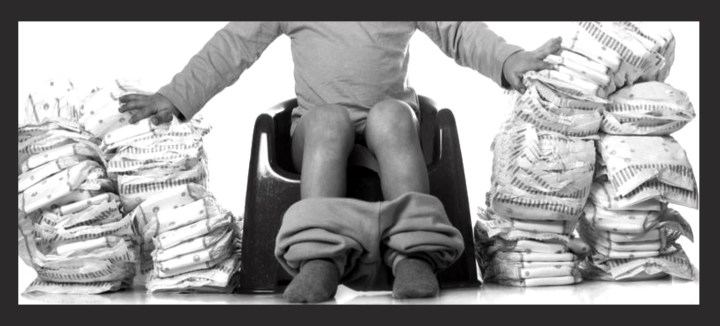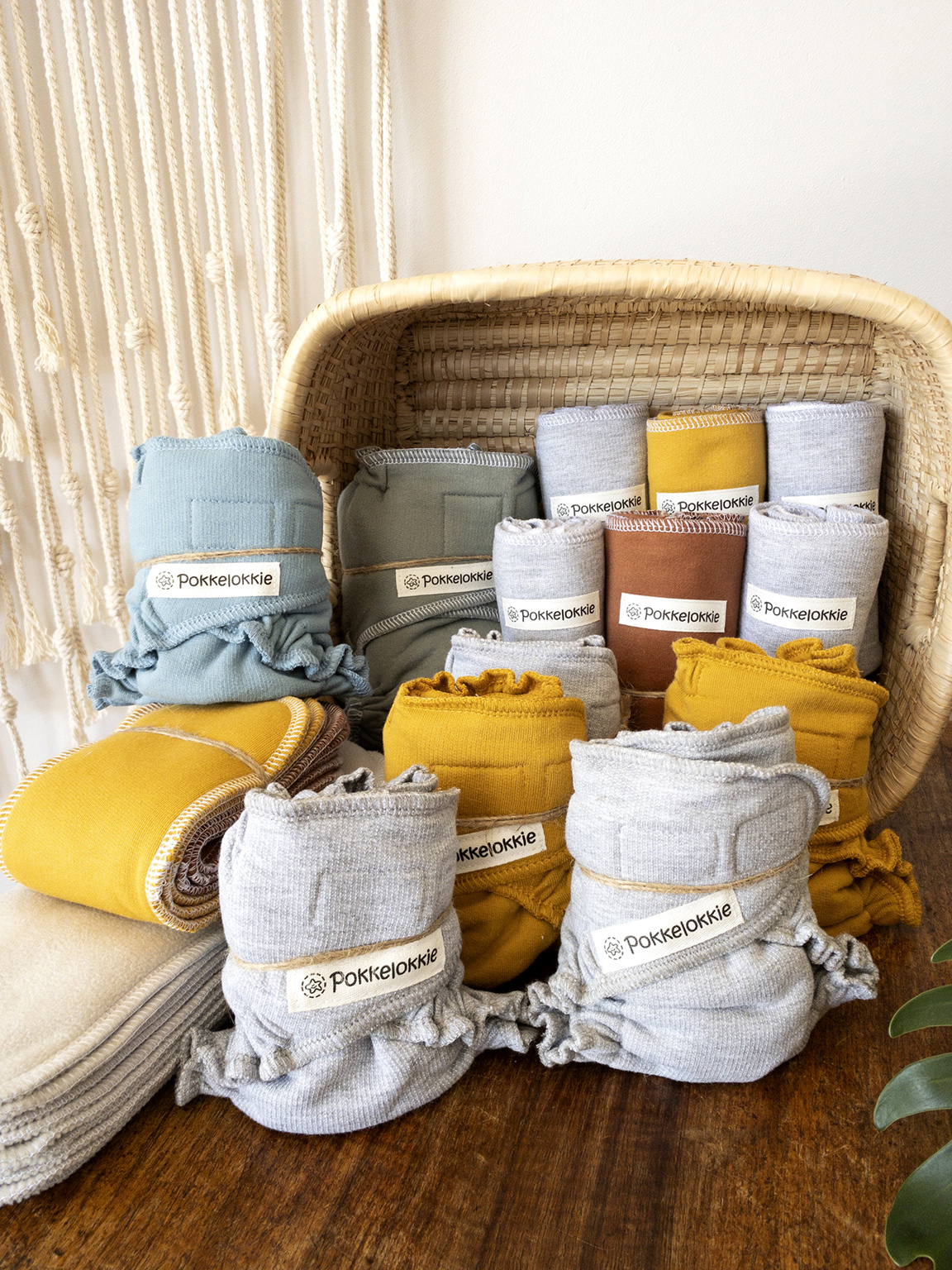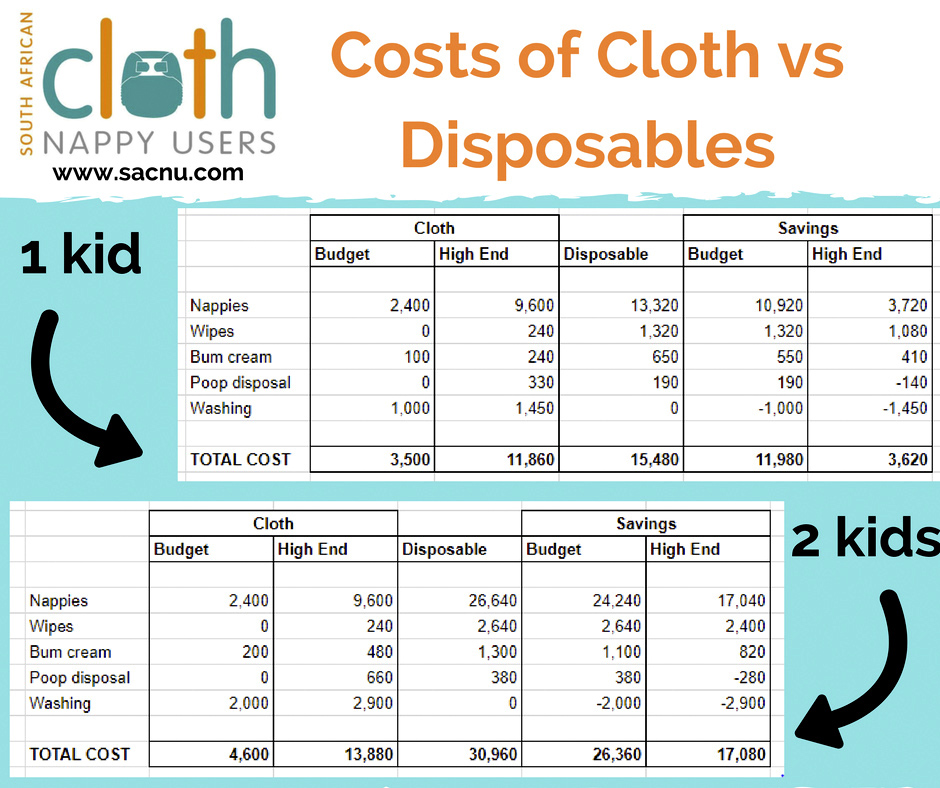STINKY STORY
Local is lekker when it comes to reusable pads and nappies (Part Two)

As the previous article in this two-part series shows, the impact of disposable nappies on the environment — both in production and when disposed — is significant and long-lasting.
For those of us concerned about the waste that disposable nappies and pads cause, choosing to investigate reusable nappies is an easy way to see if we can lessen our own footprint. Yet, braving the world of cloth nappies in 2021 is not as simple as it was for our parents’ generation.
Read Part One here.
There are so many different types, forms, and styles — pockets, All-in-ones, Snap-in-one, All-in-twos, hybrid fitteds, fitteds, prefolds, flats, trainers, and boosters — that starting out can feel overwhelming and intimidating. Each of them comes at a different price and prices vary between brands.

A selection of reusable nappies. (Photo: Kerryn van Vuuren, PokkeLokkie Cloth)
One of the reasons why parents might be worried about starting out with reusable nappies is the up-front cost. A new-born uses eight to 12 nappies per day, decreasing to around six to eight nappies as the baby grows. This means you need between 24 and 36 new-born nappies just to get started. Depending on the style of reusable nappies you buy, you’re looking at between R1,470 and R9,000 to get started with new-born nappy costs alone. And that’s just the first few months. But, South Africa’s Cloth Nappies User Association (Sacnu) calculations show that over the long term — that is, the roughly 2½ to three years before potty training — the savings are significant.
Catherine Dowie, founder of Sacnu explains that “you can use cloth nappies at a much cheaper cost than disposables. If it costs R3 per nappy and you’re doing that several times a day, by the end of the time your child uses disposables you’ve spent thousands of rands on nappies alone” and it is money that is literally thrown in the rubbish.

(Table: Supplied by SACNU)
Wanting to know where to start and what to do was exactly why Dowie decided to found the South Africa’s Cloth Nappies User Association in 2013.
“I was pregnant with my first and living in Malaysia at the time. I was doing all this research that moms naturally do and I came across a Facebook group, but it was all in Bahasa which I couldn’t speak, and I thought to myself, wouldn’t it be great if we had a community like this that was so supportive, that could help people who were brand new, so I started a Facebook group. My mom and my mom-in-law were the first members.”
Fast-forward eight years and Sacnu’s Facebook group has 18,500 members sharing advice, support, and tips on how to get the most out of cloth nappies. The team of three administrators do the work of running the group and the website as volunteers.
“We wanted a space that encouraged the love of cloth nappies and that provided support and I really do feel strongly that it has become that.” says Dowie.
Sacnu’s website includes useful tips on the various styles and what might work best for you. They also have a Try my nappy section which allows new users to try out various forms of nappy, and some other companies also offer rental services.
“The big advice that we [at Sacnu] always give is, don’t over-invest in one particular brand or one particular style. Start off slowly, gather a few of each to give yourself the range. But the other thing is to just start — start with one and see how it works.” The Facebook group provides years of research, experience and advice that can help in tricky situations.
“Probably the most popular question is, ‘what is the best brand?’, but time and time again the answer comes up the same — there is no such thing as the best brand, it depends on what you need.” But to help people who are starting out, Sacnu runs an annual survey among their users to rate favourite brands, which can help with insight into which brands might be best for different styles of reusables
According to Dowie, “Often we find that moms who have used cloth nappies switch to a more reusable menstrual product too.” So the environmental impact is significant.
Daily Maverick reached out to local cloth nappy companies (and for good measure, some reusable sanitary pads companies) to find out about their brands and where you can find them. See an alphabetical list below.
- BiddyKins — Owned by Stacey Vermeulen, launched in 2015
BiddyKins is based in Durban and operates an online store that delivers countrywide. They produce cloth nappies, sanitary pads, menstrual cups, period panties and swimwear. Some of the products are imported, and some are made in Durban and Johannesburg.
“We have been voted South Africa’s favourite cloth nappy brand for the last six years in a row. Our nappies are all custom designed and made to our strict requirements. We continuously work on developing new designs and evolving as new fabrics etc become available to offer parents and babies the best solution for their little ones.
“Our period panties are a great solution and are trim and comfortable and very absorbent. The pads have no nasty chemicals like disposable pads, they are very absorbent and available in four different absorbencies to suit all flows. Cloth pads can last for five years if properly cared for, so six to 10 pads instead of hundreds of pads being thrown away every year, will make a huge impact on waste and the environment.”
BiddyKins nappies can be purchased from their online store. www.biddykins.co.za
- Butterfly Wings Bakgat panties — Owned by Maria Watermeyer, founded in 2015
Butterfly Wings is located in Randburg, Johannesburg. They make period panties and reusable pads. Their products are manufactured in Lichtenburg in the North West.
“Our period panties are not pads, they are a pair of comfortable body fitting knickers either plain coloured or fancy designs made to measure to enable girls and ladies to continue their lives without worrying about their periods. The period panties are natural, reusable and if washed following instructions can last for years. They are not visible through clothes and depending on the flow of your period they have the ability to be worn for most of the day/night and then washed in the evening ready for the next use. The easiest way of washing is rinsing in the shower till the water runs clean so you use no chemicals.”
Bakgat panties can be purchased from Butterfly Wings via their website. https://butterflywings.co.za/
- Fancy Pants / Bamboo Baby — Owned and directed by Sally Fouche, launched in 2008
Located in Westville, KwaZulu-Natal, they produce cloth nappies and accessories as well as reusable cloth doggie diapers. They also sell a Super Nappy Wash, and Bum Balm. Most of their products are manufactured in China in order to source the bamboo fibre, but some are made in-house.
“We offer the largest range of cloth nappies and accessories that are competitively priced in SA and are of good quality.”
Fancy Pants nappies can be purchased from their online store, www.fancypantsproducts.co.za or www.bamboobaby.co.za, or purchased via Ackermans, Takealot, Faithful-to-nature and Wellness Warehouse.
- JannaNanna Cloth Nappies and Related Products — Owned by Janike Robertson, launched 2018
Based in Krugersdorp, Gauteng, JannaNanna makes a variety of different modern cloth nappies, waterproof covers, accessories for nappies, cloth menstrual pads and all-natural body butter. All of the nappies, flats, covers and cloth menstrual pads are sewn from a home workshop and the fabric patterns are designed by Janike Robertson.
They custom print their fabrics locally, and source from various speciality fabric importers and suppliers as well as local cotton mills. Many of the materials used to construct and make the nappies are imported or partially imported but all materials are sourced from local businesses. All of the cotton used in their product is locally grown, spun and dyed.
“Our brand (and product) is distinctive from other similar brands because we run (at this stage) an intimate home-based workshop which gives high priority to personal client service. We are also involved in local skills development within our business and are looking to expand in this sense in the future.”
JannaNanna products can be purchased directly from their website, https://www.jannananna.com and on their Facebook Group.
- Leafline — Founded and owned by Candy Adroliakos — launched 2018
Based in Bathurst, Eastern Cape, Leafline produces washable sanitary wear including adult and children’s diapers, sanitary towels, and chair and bed protectors.
“Our product inners are made from natural fibre taken from the leaf of the cayenne pineapple, which is stronger than cotton and absorbs moisture, smell and bacteria.”
Leafline products are available via https://www.leafline.co.za at Leach Pharmacy in Port Alfred and in Locally Yours in Port Elizabeth
- Luli&Co — Founded and Owned by Lucille Oosthuizen — launched 2016
Based in Kleinmond in the Western Cape Overberg, Luli&Co hand-makes a variety of cloth nappies as well as Ladycloth cloth menstrual pads.
“Our products are locally made, supporting our economy in every way possible. We also take pride in keeping things simple, and cost effective yet unique. Offering a reusable option for every mom and woman.”
Luli&Co products can be found at https://www.luliandco.co.za
- Mini Matters — Co-founded and managed by Elmarie Robson — launched 2014
Located in Pretoria, Gauteng, Mini Matters produces modern cloth nappies that are manufactured in White River, Mpumalanga, by a group of women from a rural area.
“Our products are 100% locally made from design and raw materials through to manufacturing. All the prints on our nappies are hand-painted by local designers. This is a very important criterion for us in order to support our local economy, other local small businesses and help create employment all the while saving our landfills from single use nappies.”
Mini Matters products can be ordered directly from their online store https://www.minimatters.co.za/ Other stockists can be found at https://minimatters.co.za/stockists/
- Moon Time — Founded by Kirsten Ruhnke — launched in 2017
Based in the Garden Route, Western Cape, Moon Time produces reusable sanitary pads, hand-made by a seamstress in George.
“Our pads are made with 100% cotton Shweshwe fabric and a 100% cotton towelling inner. They are uniquely designed for comfort and are highly absorbent, breathable, leakproof and easy to wash. Our pads come in many different colours and patterns so that women can use something beautiful when they bleed. We also have MoonTime Community which is our non-profit company and we are hoping to change the mindset of sponsors and donors and encourage them to make a long term sustainable investment and go with reusable pads instead of disposables when donating.”
Moon Time pads can be bought on their website — https://www.moontime.africa and on Faithful to Nature as well as other online shops. For other stockists see https://www.moontime.africa/stockists/
- Palesa Pads — Founded by Shérie ‘Palesa’ de Wet — launched 2017
Located in Meyerton Park, Gauteng, Palesa Pads produces high quality, reusable, washable sanitary pads. The pads come in five variants — mini (light menstrual flow), midi (medium menstrual flow), maxi (heavy menstrual flow), mega (very heavy menstrual flow) and mama (for extremely heavy menstrual flow or maternal use).
“Palesa Pads are 100% washable and reusable. The high quality sports fabric used ensure that the pads do not leak or stain. There are no chemicals in the pads (as they are made from cloth) so there are fewer skin irritations and infections. Palesa Pads are linked to lighter menstrual cramps and have no unpleasant odours. The pads are reusable for up to five years, so they save you money. The pads are also environmentally friendly because you don’t dispose of them, they do not wind up in landfills or pit toilets. In fact, each Palesa Pad replaces 200 disposable pads over a five year period, which has a hugely positive impact on the environment.”
Palesa Pads can be purchased from all Ackermans stores countrywide, Euro Superspar in Three Rivers, Vereeniging, and via the Palesa Pads online shop https://www.palesapads.com/shop
- PokkieLokkie Cloth — Founded by Kerryn van Vuuren — launched in 2015
Located in Brenton on Sea, Knysna, Western Cape, PokkieLokkie Cloth produces handmade cloth nappies and accessories.
“Everything is hand made from locally produced fabrics. We do not import any items. Our cloth nappies are fully absorbent meaning the whole nappy wraps around the baby and absorbs and a cover is placed over it. This is the most reliable type of cloth nappy one can buy provided it is made from good quality fabrics. Our nappies are durable and can last many, many children. The quality is excellent, providing a sustainable and reusable solution for many, many years.”
PokkieLokkie Cloth products can be purchased via their online store https://pokkelokkie.co.za/
- Subz Pants and Pads — Owned and founded by Susan Barnes — launched 2011
Located in Durban, KwaZulu Natal, Subz Pads produces a range of washable, sustainable, eco-friendly sanitary pads for menstruation, maternity, and incontinence for men and women. They also manufacture washable nursing pads. All pads are manufactured in Durban.
“Subz pads were the first washable, sustainable, eco-friendly sanitary pads in South Africa and we have a patent for our unique design. There are two different fastening types, attaching and self-clipping, meaning people can select their preferred option. The pads are manufactured with high absorbency tested fabric, manufactured with cotton fabric and mercerized elastic for long life. The panties have their own special pattern with a fuller ‘bottom’ to accommodate a fuller South African figure. They are long lasting — between three and five years — depending on the number of pads per pack. They contain no gels or chemicals and are therefore allergy free and hypoallergenic.”
Subz pads can be purchased from the Clicks retail chain, Takealot or their online store https://subzpads.co.za/shop/ DM/MC



















 Become an Insider
Become an Insider
Comments - Please login in order to comment.